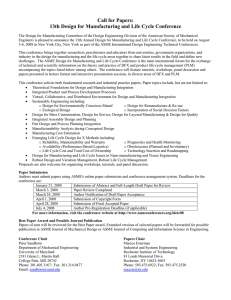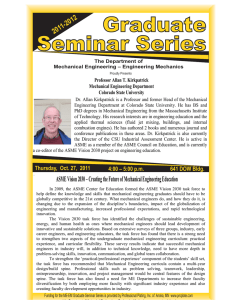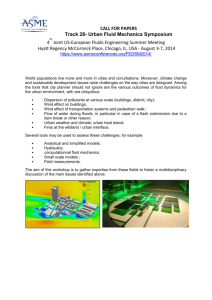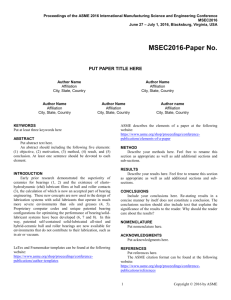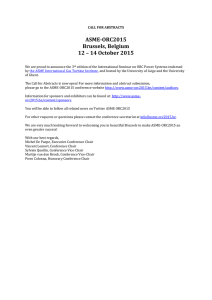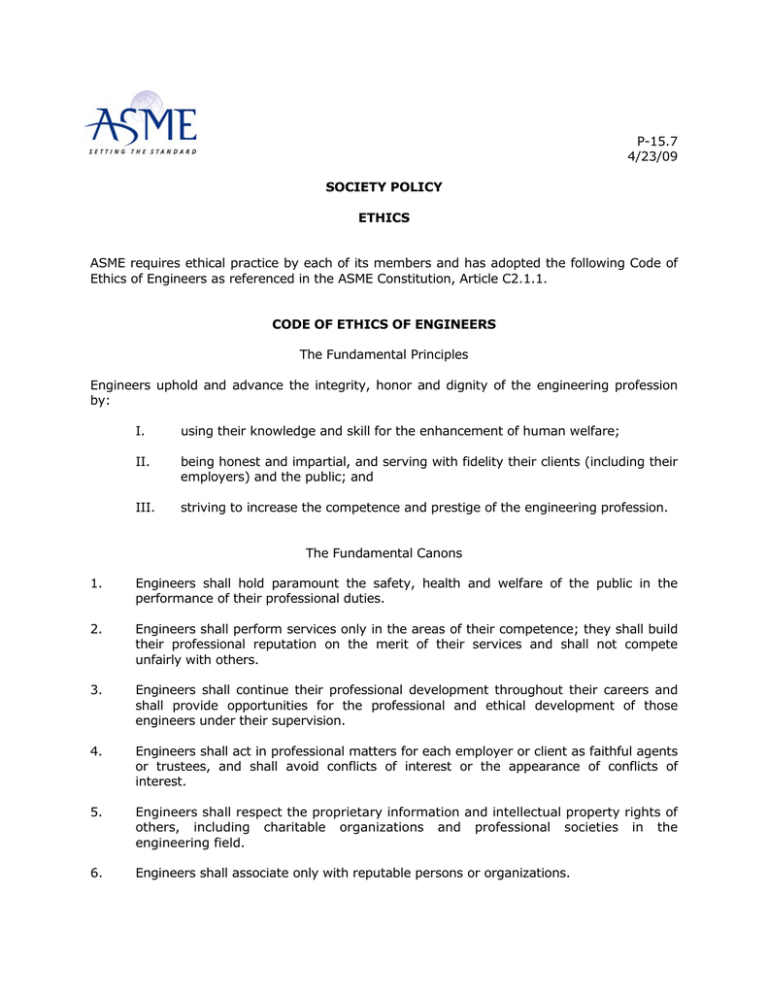
P-15.7
4/23/09
SOCIETY POLICY
ETHICS
ASME requires ethical practice by each of its members and has adopted the following Code of
Ethics of Engineers as referenced in the ASME Constitution, Article C2.1.1.
CODE OF ETHICS OF ENGINEERS
The Fundamental Principles
Engineers uphold and advance the integrity, honor and dignity of the engineering profession
by:
I.
using their knowledge and skill for the enhancement of human welfare;
II.
being honest and impartial, and serving with fidelity their clients (including their
employers) and the public; and
III.
striving to increase the competence and prestige of the engineering profession.
The Fundamental Canons
1.
Engineers shall hold paramount the safety, health and welfare of the public in the
performance of their professional duties.
2.
Engineers shall perform services only in the areas of their competence; they shall build
their professional reputation on the merit of their services and shall not compete
unfairly with others.
3.
Engineers shall continue their professional development throughout their careers and
shall provide opportunities for the professional and ethical development of those
engineers under their supervision.
4.
Engineers shall act in professional matters for each employer or client as faithful agents
or trustees, and shall avoid conflicts of interest or the appearance of conflicts of
interest.
5.
Engineers shall respect the proprietary information and intellectual property rights of
others, including charitable organizations and professional societies in the
engineering field.
6.
Engineers shall associate only with reputable persons or organizations.
2
P-15.7
4/23/09
7.
Engineers shall issue public statements only in an objective and truthful manner and
shall avoid any conduct which brings discredit upon the profession.
8.
Engineers shall consider environmental impact and sustainable development in the
performance of their professional duties.
9.
Engineers shall not seek ethical sanction against another engineer unless there is
good reason to do so under the relevant codes, policies and procedures governing
that engineer’s ethical conduct.
10.
Engineers who are members of the Society shall endeavor to abide by the
Constitution, By-Laws and Policies of the Society, and they shall disclose knowledge
of any matter involving another member’s alleged violation of this Code of Ethics or
the Society’s Conflicts of Interest Policy in a prompt, complete and truthful manner
to the chair of the Committee on Ethical Standards and Review.
The Committee on Ethical Standards and Review maintains an archive of interpretations to
the ASME Code of Ethics (P-15.7). These interpretations shall serve as guidance to the user
of the ASME Code of Ethics and are available on the Committee’s website or upon request.
Responsibility:
Centers Board of Directors/Center for Professional Career and
Professional Advancement/Committee on Ethical Standards and Review
Reassigned from Centers Board of Directors/Center for Professional
Development, Practice and Ethics/Committee on Ethical Standards and
Review 4/23/09
Reassigned from Council and Member Affairs/Board on Professional
Practice & Ethics 6/1/05
Adopted:
March 7, 1976
Revised:
December 9, 1976
December 7, 1979
November 19, 1982
June 15, 1984
(editorial changes 7/84)
June 16, 1988
September 12, 1991
September 11, 1994
June 10, 1998
September 21, 2002
September 13, 2003
(editorial changes 6/1/05)
November 5, 2006
(editorial changes to the responsible unit 4/09)
SOCIETY POLICY
P-15.8
9/14/09
CONFLICTS OF INTEREST
I.
PREAMBLE
Each individual acting for or in the name of ASME is in a position of trust. Particularly
since ASME holds as paramount the safety, health, and welfare of the general public,
each such individual has fundamental responsibility to exercise impartial professional
judgment to enhance the practice of mechanical engineering in the public interest. This
Society Policy is intended to further assure the objectivity and public confidence in the
integrity of all Society deliberations and statements, by establishing guidelines and
procedures concerning conflicts of interest. It is acknowledged and understood that
competent and knowledgeable individuals of recognized abilities, qualifications and
interest who participate in professional activities may have potential conflicts of interest.
This Society Policy establishes guidelines and procedures to enable such individuals to
act ethically and to uphold the integrity of the Society's policies, rules, codes and
standards.
II.
POLICY
A.
The potential for a conflict of interest exists whenever a person owes a loyalty to
multiple interests or organizations. Having different interests or loyalties does
not constitute a conflict of interest when the action desired by each interest is
the same. This situation may be described as a community of interest.
B.
A conflict of interest occurs only when loyalty to one interest would impel a
course of action different from that impelled by another interest. For example,
while acting for or on behalf of the Society, a volunteer may consider a matter
which directly affects the specific rather than the collective interests of the
individual's employer or a competitor of the employer.
In such instances, there could be a conflict of interest between exercise of the
volunteer's independent professional judgment on behalf of ASME and the public
and the individual's loyalties and responsibilities to his or her employer or
another entity.
C.
In many ASME standards-writing committees and other committees, the
procedures for appointment provide for a balanced or diversified representation
among the various categories of interest within the scope of that committee's
concern. This "balance of interest" minimizes the instances of appearance of
conflict of interest by preventing situations in which a single interest group could
control the action on an issue. Accordingly, where general categories of interest
were considered in appointing a balanced committee or other group, an
individual's identification with the particular interest shall not be grounds for
raising an issue of the appearance of a conflict of interest. This is particularly so
because the removal of one or more individuals representing a particular
2
P-15.8
9/14/09
category of interest on conflict of interest grounds could upset the planned
balance of economical and technical interests.
D.
III.
It is nevertheless the duty of volunteers acting for or on behalf of the Society to
be aware of the possibility of a conflict of interest between their responsibilities
to ASME and the public on the one hand and to their employer or another entity
on the other. All volunteers have a fundamental responsibility to refrain from
participating in Society decision-making when a competing interest precludes or
inhibits the exercise of the volunteer's independent professional judgment on
behalf of ASME, or when the nature of the competing interest is such that the
volunteer's continued participation would unreasonably jeopardize the integrity
of the decision-making process.
RESPONSIBILITIES
A.
Individual Responsibilities
In instances where it is clear to individual volunteers that their judgment with
respect to a matter pending before ASME is controlled by their loyalty to a
competing interest, they should disqualify themselves and refrain from
participating in the deliberations and decision-making regarding the conflictaffected matter.
This does not preclude their attendance and participation at any meeting of a
committee or other body on the same basis as any non-member of the
committee or other body.
In instances where individual volunteers believe that there may be the
appearance of a conflict of interest, as in II.C above, although they believe that
their independent judgment will not be affected by a competing interest, the
volunteers should nevertheless avail themselves of at least one of the following
consultative courses of action:
1.
If an individual is serving on a sector, board, division, committee,
section, subcommittee or other decision-making body, the individual
should make certain that all concerned with the projected deliberations or
decision-making clearly understand the facts and circumstances involved
in this possible conflict situation. Then following due consideration of the
circumstances involved, unless a three-fourths majority concur by secret
ballot that the continued participation will not unreasonably jeopardize
the integrity of the decision-making process, the individual shall refrain
from participation in deliberations not open to non-members and
decision-making regarding the conflict-affected matter.
Such
disqualification considerations may be either referred or appealed (in the
first instance, to the appointing committee or supervisory body, if any,
and then (if unresolved) to the conflict of interest oversight body
designated by the Board of Governors pursuant to Section IV., below) by
3
P-15.8
9/14/09
the chair of the committee, subcommittee or other body, the individual
volunteer or any other participant in the potential conflict of interest
consideration;
2.
B.
If the individual is acting for or on behalf of ASME other than in a
committee or group participation capacity, or if an individual serving on a
committee or group wishes to bypass the step described in Section
III.A.1, the individual should bring the potential conflict of interest matter
directly to the attention, in the first instance, of the appointing committee
or supervisory body, if any, and then (if unresolved) to the attention of
the conflict of interest oversight body designated by the Board of
Governors pursuant to Section IV., below.
Challenges by Other Members
Any member of a sector, board, division, committee, section,
subcommittee or other decision-making body who believes that the
continued participation of any other member of that body may
unreasonably jeopardize the integrity of the decision-making process
may call for the consultative courses of action set forth in Sections III.A.1
and III.A.2 above.
IV.
IMPLEMENTATION
Individuals participating as volunteers in ASME activities have the primary responsibility
for assuring their adherence to this Society Policy. Nonetheless, given the sensitive
nature of these considerations and the interest of the Society in preserving the integrity
of its reputation and processes, ASME retains responsibility for oversight in this area.
Accordingly, the Board of Governors hereby assigns oversight responsibility for this
Society Policy to the ASME Committee on Ethical Standards and Review.
The
Committee on Ethical Standards and Review shall have authority to review questions of
conflicts of interest and to render opinions thereon. The Committee on Ethical Standards
and Review may authorize the Chair of the Committee on Ethical Standards and Review
to issue a letter of warning or admonishment to persons who violate this policy or
request that the Chair to refer the matter to the Executive Director for processing as an
ethics complaint under policy P-15.4. A decision of the Committee on Ethical Standards
and Review shall be binding and final if a letter of warning or admonishment is the
course of action.
V.
ASME STAFF
The provisions of this Society Policy are applicable to the ASME staff, as well as to the
members of sectors, boards, divisions committees, sections, subcommittees, other
decision-making bodies and individuals acting for or on behalf of ASME, as set forth
above.
4
VI.
P-15.8
9/14/09
USE OF ASME TITLES
The use of Society titles for members holding elected and non-elected office shall follow
the guidelines stated in paragraph III.D.4 of Society Policy P-14.6, Name, Seal,
Emblem, Initials, Titles, Identification and Certificates. Violations of these guidelines
shall be considered under violations of the Code of Ethics. (See Society Policy P-15.7,
Ethics.)
VII.
USE OF ASME STATIONERY
Society Policy P-14.6 Society Name, Seal, Emblem, Initials, Titles, Identification and
Certificates) prescribes the use of ASME stationery in Paragraph III.B.4.
VIII. NOTICE
Each time an individual is elected or appointed to a position, or appointed to represent
ASME in any capacity, including all members of ASME standards writing committees, the
individual shall at the time of election or appointment be sent a copy of this Society
Policy and Society Policy P-15.7, Ethics and P-14.6, Society Name, Seal, Emblem, etc.,
and should be advised to adhere to the provisions of these policies as a condition of
acting for or representing the Society.
IX.
ACCEPTANCE
Before taking office, unless there is in ASME's files a prior signed acceptance of Society
Policy P-15.8, each member of a sector, board, division, committee, district, section
subcommittee, or other decision-making body, as designated by each sector, and each
individual elected or appointed to act for or on behalf of ASME shall state in writing
adherence to the conditions of this Society Policy. If this signed Statement is not on
file, the member may not take office.
Additionally, an Annual Disclosure regarding Conflicts of Interest shall be submitted by
voting members of the Board of Governors, the Executive Director, Treasurer, Assistant
Treasurer, Secretary, Assistant Secretary, and key employees (as defined by the
Internal Revenue Service).
Note that when either Policy P-14.6 or P-15.8 receives substantive revision as
determined by the Board of Governors, all persons required to have a Conflict of
Interest Statement on file shall receive a copy of the revised Policy and shall be
requested to sign a new Conflict of Interest Statement.
X.
OVERSIGHT
At least twice a year, the Executive Director of ASME shall submit a report to the
Committee on Ethical Standards and Review certifying that the requirements of Section
VIII, Notice, and Section IX, Acceptance, have been met, and shall include names of
those not in compliance.
5
P-15.8
9/14/09
Should there be any occurrence where a member does not re-sign a Conflict of Interest
Statement and forward it to the Society within 90 days, the Executive Director shall
inform the pertinent board, committee, sector or other body requiring the execution of a
Conflict of Interest Statement that the member is in violation of Section IX of Policy P15.8 and may not continue in office or further represent ASME.
When action is taken by a member to comply with this Policy, that individual will be
reinstated to their position and allowed to represent ASME in their previous position.
Responsibility:
Centers Board of Directors/Center for Career and Professional
Advancement/Committee on Ethical Standards and Review
Reassigned from Centers Board of Directors/Center for Professional
Development, Practice and Ethics/Committee on Ethical Standards and
Review 4/23/09
Reaffirmed from Council on Member Affairs/Board on Professional
Practice & Ethics 6/1/05
Adopted:
June 23, 1976
Revised:
November 18, 1982
(editorial changes 2/83)
June 14, 1985
(editorial changes 11/85)
(editorial changes 9/86)
June 11, 1987
(editorial changes 3/88)
(editorial changes 7/88)
(editorial changes 11/88)
September 11, 1994
March 15, 1996
November 21, 1996
(editorial changes 3/97)
(editorial changes 6/04)
(editorial changes 6/1/05)
(editorial change in responsible unit 4/09)
September 14, 2009
P-15.9
4/23/09
SOCIETY POLICY
POLICY AGAINST DISCRIMINATION (INCLUDING DISCRIMINATORY
HARASSMENT) -- MEMBERS
I.
II.
PREFACE
A.
Discrimination (including discriminatory harassment) by a member of
ASME against any other member or ASME employee or job applicant on
the basis of race, color, religion, sex, national origin, age, citizenship
status, disability, covered veteran or military status, or any other
characteristic protected by state or local equal employment opportunity
laws, shall not be tolerated.
B.
Discrimination (including discriminatory harassment) by a member of
ASME against an individual who is neither a member nor an employee or
job applicant of ASME on the basis of race, color, religion, sex, national
origin, age, citizenship status, disability, covered veteran or military
status, or any other characteristic protected by state or local equal
employment opportunity laws, is also of concern to ASME when the
conduct occurs on ASME premises or during an ASME activity.
C.
Conduct in violation of this Policy is grounds for discipline by ASME, up to
and including expulsion from membership.
PURPOSE
A.
To state the ASME policy against discrimination (including discriminatory
harassment) by members.
B.
To describe the types of conduct prohibited by this Policy.
C.
To establish a procedure for dealing with violations of this Policy.
2
III.
P-15.9
4/23/09
POLICY
A.
ASME prohibits discrimination on the basis of race, color, religion, sex,
national origin, age, citizenship status, disability, covered veteran or
military status, or any other characteristic protected by state or local
equal employment opportunity laws with respect to any decision or
recommendation made by a member concerning (a) the participation of
another member in an ASME activity or (b) the hiring, performance
evaluation or a work assignment of an ASME employee.
B.
Prohibited discriminatory conduct also includes conduct by a member
that constitutes harassment based on race, color, religion, sex, national
origin, age, citizenship status, disability, covered veteran or military
status, or any other characteristic protected by state or local equal
employment opportunity laws.
C.
D.
1.
Examples of such conduct are racial or ethnic slurs and
threatening, intimidating or hostile acts directed at a particular
sex or religion, or directed at a member or ASME employee
because of his or her national origin or color.
2.
Harassment does not require an intent to offend. Thus, when
unwelcome by the recipient, certain conduct meant as a joke, a
prank, or even a compliment can lead or contribute to
harassment.
Sexual harassment is a specific type of discriminatory harassment.
ASME prohibits conduct that constitutes sexual harassment. Unwelcome
sexual advances, requests for sexual favors and other verbal or physical
conduct of a sexual nature constitutes sexual harassment for purposes of
this Policy when:
1.
Submission to such conduct is made explicitly or implicitly a term
or condition of an individual’s work assignment at ASME or
participation in any activity of ASME;
2.
Submission to or rejection of such conduct by an individual is
used as the basis for decisions or recommendations affecting such
individual’s employment at ASME or participation in any activity of
ASME; or
3.
Such conduct has the purpose or effect of unreasonably
interfering with an individual’s work performance at ASME or
participation in any activity of ASME.
No member with a leadership role is at any time to (1) threaten or imply
that an individual’s submission to or rejection of a sexual advance will in
any way influence any decision, recommendation or evaluation regarding
that individual’s employment at ASME or participation in any activity of
ASME; or (2) make any decision or recommendation concerning an
3
P-15.9
4/23/09
individual’s employment at ASME or participation in any activity of ASME
on such a basis.
E.
F.
IV.
Other conduct by members in ASME's workplace or in connection with
any ASME activity that creates or could lead or contribute to an
intimidating, hostile or offensive work environment, whether it be in the
form of physical, visual or verbal harassment, is also prohibited. Such
conduct includes, but it is not limited to:
1.
repeated unwelcome sexual flirtations, advances, or propositions;
2.
verbal abuse of a sexual nature;
3.
graphic verbal comments of a sexual nature about an individual's
body;
4.
sexually degrading words used to describe an individual;
5.
the access to, or display or distribution of, sexually suggestive
objects or pictures (including via the use of computers); and
6.
inappropriate touching of an individual.
ASME also prohibits retaliation against any ASME member for making a
good faith report or complaint of an alleged violation of this Policy, or for
participating in an investigation of such a report of complaint, under the
procedures set forth below.
PROCEDURE
A.
Any member who believes that he or she has been subjected to any
behavior by any ASME member or employee that violates this Policy
should immediately bring the matter to the attention of the appropriate
individual as set forth in paragraphs 1. and 2. below. Members who have
information about conduct violative of this Policy directed toward other
members or any ASME employee are also encouraged to report the
relevant facts pursuant to this Policy. Prompt reporting is very important
so that ASME can take action to stop the conduct before it is repeated.
1.
If the alleged victim and the alleged offender are members who
are not employees of ASME, the complaint should be made to
either of two members of the Committee of Past Presidents that
have been designated by that Committee to serve in this function,
currently Susan Skemp and Reginald Vachon, by e-mailing
asmepastpresidentcontact@asme.org. Those individuals (and any
other chair, leader, or vice president who may receive information
concerning the existence of such a complaint) should immediately
report the complaint to the Executive Director, regardless of
whether the complaint was written or oral.
2.
If either the alleged victim or alleged offender is an employee of
ASME, the complaint should be brought to the attention of the
4
P-15.9
4/23/09
Executive Director. If the alleged offender is an employee of
ASME, the procedures set forth in Sections IV.B. and IV.C. for
handling the complaint will not apply. Instead, the Executive
Director will report the complaint to ASME's Human Resources
Department, and the complaint will be handled in its entirety in
accordance with ASME’s Employee Handbook (the applicable
section(s) of which shall be available to any member upon
request). If the alleged victim is an employee of ASME but the
alleged offender is a member, the complaint will be handled in
accordance with ASME’s Employee Handbook, except that upon
determining that this Policy has been violated, the Human
Resources Department will report that determination to the
Executive Director and the Vice President for Career and
Professional Advancement, who will decide whether disciplinary
measures are appropriate in accordance with Section IV.C.4.
below, and Sections IV.C.5. and IV.C.6. below will also apply.
3.
B.
If either the alleged victim or alleged offender is neither a
member nor an employee of ASME, but the alleged incident
occurred on ASME premises or during ASME activities, the
Executive Director shall, based on the circumstances, determine
what, if any, action should be taken. If the alleged incident did
not occur on ASME premises or during ASME activities, the
Executive Director shall inform the complainant that ASME has no
jurisdiction and will accordingly take no action.
Upon receiving a report of an alleged violation of this Policy by a member
against another member, the Executive Director shall proceed as follows:
1.
The Executive Director and the Vice President for Career and
Professional Advancement, shall, in consultation with each other,
decide whether an attempt should be made to resolve the
complaint via communication with the complainant and the
alleged offender (“facilitation”).
If they decide to pursue
facilitation, the Executive Director, the Vice President for Career
and Professional Advancement or another individual selected by
the Executive Director in consultation with the Vice President for
Career and Professional Advancement shall serve as the
facilitator. Should facilitation result in resolution, the resolution
agreed to by the complainant and the alleged offender shall be
committed to writing and signed by both parties.
2.
If the Executive Director and Vice President for Career and
Professional Advancement decide that the matter should be
formally investigated (whether or not it is referred to facilitation),
the complainant will be informed and should promptly forward to
the Executive Director a signed complaint detailing the
allegations. In such a case, the procedures set forth in Section C
below shall apply.
3.
Notwithstanding any other provision of this Policy, the Executive
Director, President or the Board of Governors may investigate any
5
P-15.9
4/23/09
report of an alleged violation of this Policy (whether or not the
complainant has submitted a signed complaint).
C.
An investigation of any complaint submitted pursuant to Section IV.B.2.
shall proceed as follows:
1.
The Executive Director or the Vice President for Career and
Professional Advancement will investigate or appoint another
individual to investigate. The investigator will conduct interviews
of the complainant, the alleged offender and other individuals as
necessary.
2.
After completion of the investigation, the investigator will make a
written report to the Executive Director and the Vice President for
Career and Professional Advancement, who will determine
whether this Policy has been violated.
3.
If the Executive Director and the Vice President for Career and
Professional Advancement determine that this Policy has not been
violated: (i) the complainant and alleged offender will be so
informed; (ii) any written records concerning the investigation will
be kept by the Executive Director in a confidential file for three
years and will be destroyed at the end of that period if within that
period no similar complaint against the alleged offender has been
found to be valid; and (iii) no further action will be taken.
4.
If the Executive Director and the Vice President for Career and
Professional Advancement determine that this Policy has been
violated, they will decide on any appropriate remedial measures
and/or disciplinary measures, up to and including expulsion from
ASME, and inform the offender and the Board of Governors of
their decision in writing. The Executive Director or the Vice
President for Career and Professional Advancement will also
inform the complainant of the determination that the Policy has
been violated, and, if applicable, of any remedial measures, and
will determine what, if anything, the complainant shall be advised
about any disciplinary measures taken as to the offender.
5.
The individual found to have violated this Policy may request in
writing that the Board of Governors review the investigation
process for compliance with Sections IV.C.1 – IV.C.4. of this
Policy (or, if relevant, ASME's Employee Handbook). Any such
request must be received by the Board of Governors within ten
(10) days after the date the individual was informed of the
decision. The Board of Governors will not review the merits of the
decision. The Board of Governors will complete its review within
thirty (30) days of receiving a timely written request. Any
remedial and/or disciplinary measures will be held in abeyance
pending completion of the Board of Governors' review.
6.
If the Board of Governors conducts a review and finds that the
investigation complied with the relevant procedures, the remedial
6
P-15.9
4/23/09
and/or disciplinary measures decided upon by the Executive
Director and the Vice President for Career and Professional
Development will be taken. If the Board of Governors finds that
the investigation did not comply with the relevant procedures,
they may recommend (i) that the case be closed; (ii) that further
investigative steps be taken in accordance with the appropriate
policy; or (iii) if the failure to adhere to procedure was
insignificant, that the remedial and/or disciplinary measures
decided upon by the Executive Director and the Vice President for
Career and Professional Advancement be carried out.
The
Executive Director and the Vice President for Career and
Professional Advancement will take any further action necessary
to resolve the complaint in accordance with the Board of
Governors' recommendation.
D.
If the Vice President for Career and Professional Advancement or
Executive Director decides to abstain from participating in handling any
complaint or report of an alleged violation of this Policy, he or she shall
be replaced as follows:
1.
In the case of the Vice President for Career and Professional
Advancement, the President shall appoint a replacement.
2.
In the case of the Executive Director, he or she shall be replaced
by the Deputy Executive Director with the greatest seniority. If
such Deputy Executive Director decides to abstain, he or she shall
be replaced by the President, or, if he or she decides to abstain,
the immediate Past President.
3.
In the event all of the individuals holding the positions specified
above shall abstain, the Board of Governors shall appoint from its
membership two individuals to fulfill the roles of the Vice
President for Career and Professional Advancement and the
Executive Director under this Policy.
E.
ASME will strive to keep the identity of persons making complaints
pursuant to this Policy as confidential as possible.
F.
It is a violation of this Policy for any retaliatory action to be taken or
threatened against an individual who in good faith reports or provides
information about a possible violation of this Policy or who in good faith
participates in a related investigation or exercises any other right
protected by the equal employment opportunity laws. In the event that
a member believes he or she has been retaliated against for such action,
he or she should use the reporting procedures outlined in Section IV.A. of
this Policy to report the pertinent facts promptly. ASME will investigate
and take appropriate action in the manner described above.
G.
The making by a member of a complaint pursuant to this Society Policy
which such member knows to be false or the providing by a member of
information which such member knows to be false relating to such a
complaint is a violation of the Code of Ethics of Engineers and may be the
7
P-15.9
4/23/09
subject of a complaint against such member brought pursuant to Society
Policy P-15.4. Any complaint of a violation of this Policy that has been
determined to have been knowingly false shall be expunged from any
and all records of ASME relating to the alleged offender.
H.
Responsibility:
The procedures for handling complaints set forth in Sections IV.C. and
IV.D. above will also apply:
1.
If a complaint of a violation of this Policy is made against a
member of ASME by an individual who is neither a member nor
an employee of ASME, and the alleged incident occurred on
Society premises or during Society activities; and
2.
If a complaint of a violation of this Policy is submitted to the Chair
of the Committee on Ethical Standards and Review as an alleged
ethical violation.
Centers Board of Directors/Center for Career and Professional
Advancement
Reassigned from Centers Board of Directors/Center
Professional Development, Practice and Ethics 4/23/09
for
Reassigned from Council on Member Affairs/Board on Professional
Practice and Ethics 6/1/05
Adopted:
September 10, 1993
Revised:
March 12, 1999
(editorial changes 6/05)
June 8, 2008
(editorial changes 4/09)

